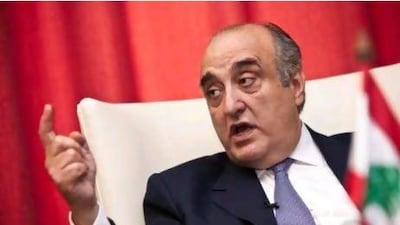DUBAI // The Lebanese tourism minister assured tourists yesterday that his country was safe to visit.
Fadi Abboud described the situation in Lebanon as “under control” and said that some incidents presented in the media were exaggerated.
“The situation in Lebanon is not as bad as some media is trying to show.”
The UAE was one of four countries in the GCC to issue travel advisories following deadly clashes in northern Lebanon between supporters and opponents of the Al Assad regime in Syria.
Last week, the UAE Ministry of Foreign Affairs issued its second warning, less than a month after issuing its first. Bahrain, Kuwait and Qatar have also issued travel advisories.
“Certainly I understand the position of the government [to protect its citizens] but I’m here to assure you that not everything you see on TV is true,” Mr Abboud said.
He said that while tourists from the four countries that issued advisories accounted for 7 per cent of all tourists last year, they accounted for nearly a quarter of tourism spending.
“The most important tourists in Lebanon are the Gulf tourists and the Arab tourists in general,” he said.
Mr Abboud said that it was normal for the country to have its ups and downs.
“Lebanon is like having a crazy girlfriend, if you know what I mean,” he said. “There are always surprises there – not necessarily awful surprises, but a lot of pleasant surprises.”
He said that there was round-the-clock surveillance by police and security, and that cases where there have been issues of violence, such as those in the refugee camps, were “isolated incidents”.
Yesterday, the families of 11 Lebanese men kidnapped in Syria blocked roads to Beirut’s airport. Mr Abboud said that the military had the situation under control.
The tourism industry accounts for 20 per cent of Lebanon’s economy.
Annual spending per capita by tourists is about US$4,000 (Dh14,690), and the industry employs about 240,000 citizens during the peak season, making it the “most important sector in the country”.
Last year, Lebanon received almost 1.7 million tourists with total expenditures reaching about $7 billion. On average, 40 per cent of tourists come from the Arab region and 30 per cent of those come from the GCC.
Mr Abboud said he hopes to see similar outcomes this year, which may not be the case if the travel advisories remain intact.
The country has already begun to feel the effect of the political turmoil of neighbouring Syria.
Lebanon normally receives between 300,000 to 350,000 road tourists – travellers coming through the Syria borders – every year. Currently the country is getting less than 5 per cent that number.
“About 30 per cent of GCC tourists come through the roads,” he said. “This has decreased by 98 per cent. Because of the tragic situation in Syria, road tourism has almost diminished.”
In the first five months of this year, Lebanon received 500,000 tourists, with a 15 per cent increase in the number of visitors from Arab countries. Overall, however, the country witnessed a 6 per cent decline in the total number of tourists.
In an effort to reverse the travel advisories, Lebanon has invited UAE officials on a “fact finding mission” to experience the country first hand.
“I think when and if they do that, they will feel a bit more at ease,” Mr Abboud said.
mismail@thenational.ae

